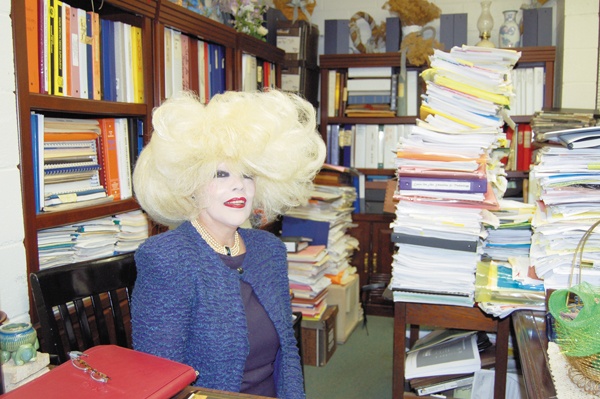MaBel Ferreiro-Fujiuchi, CEO of Kauai Economic Opportunity, got her foot in the door through the kitchen. But it was Ferreiro-Fujiuchi’s mind for science that helped her advance and eventually run Kauai Economic Opportunity Inc., the nonprofit dedicated to helping the
MaBel Ferreiro-Fujiuchi, CEO of Kauai Economic Opportunity, got her foot in the door through the kitchen.
But it was Ferreiro-Fujiuchi’s mind for science that helped her advance and eventually run Kauai Economic Opportunity Inc., the nonprofit dedicated to helping the island’s homeless.
It was chemistry, in fact, in which she earned a minor at college.
“The chemistry is what helped me with this job,” said Ferreiro-Fujiuchi. “It’s how I approached applying for grants.”
More on that in a bit.
Ferreiro-Fujiuchi has worked for KEO for more than 40 years, nearly the same amount of time she’s been married to her husband. The native Kauaian had just returned to the island after graduating from Wayne State College in Nebraska with a degree in home economics and nutritional science. The degree helped her land a job as a nutrition educator back when the nonprofit helped a few hundred people a month, if that.
Not long after getting hired, she began writing grants for the organization.
And that, she said, is when her science mind took over.
Applying for money — the roughly $5-million-a-year operation is reliant on grants and donations — isn’t any different than experimenting and documenting the results, she said. You have a theory, you test it, you document it, over and over, and you draw a conclusion.
It may sound strange, she said, “but that’s how I’ve always approached grant writing … You have to show everything.”
Four decades later, KEO serves 5,000 individuals a year, with around 20 programs from housing and food to helping people find work, finish high school, even apply for college. The organization, with 60 employees across the island, is celebrating its 50th anniversary in March.
Ten percent of the island’s population is at 100 percent of the poverty level, or worse.
But the compassionate side of the organization is Ferreiro-Fujiuchi’s favorite.
“They’re no different than us, they just don’t have a home,” is what she often says of her clientele.
One of her favorite stories is when she left her Lihue office one evening and a man who was staying at KEO’s adjacent shelter offered Ferreiro-Fujiuchi leftovers from the shelter’s dinner.
He didn’t know her, and certainly not as CEO, but there he was, offering to share what had been given to him.
“That’s when I knew I had made it,” Ferreiro-Fujiuchi said. “I thought, ‘these people have huge hearts.’”
TGI: What does the homeless population look like? Is it a big problem on Kauai?
MFF: It is a problem here on Kauai. A portion of the population are the people who live in parks … That’s the population people are familiar with. But there are also people who just don’t have a home … They may be people where something may have happened in their life. You just don’t know, but they maybe living at a friend’s house or living on a friend’s couch.
TGI: Talk about that if you can. A lot of people think of the face of homeless as people living in parks, under bridges. But what about someone who just lost their job and they are people that look like your neighbor. Is that a big portion of homelessness? And are people aware?
MFF: It is and I don’t think everyone is aware … It’s usually, something has happened in their life … They usually have a story but you may not know what it is. They could be going though a divorce, there could have been an medical issue, an unforeseen medical expense, something. Or they could have lost their job … I always say, these people are just like you and me, the only difference is they don’t have a home.
TGI: What’s been the best thing about your job?
MFF: The people, the compassion that you see.
TGI: Where can Kauai improve in the fight against homelessness?
MFF: I think maybe we could focus on affordable housing. Housing on Kauai is expensive and I think we could look at providing different kinds of housing.
TGI: Is it a bigger problem because housing on Kauai is expensive in general? What needs to happen?
MFF: It is. I think one option could be — not saying everywhere — but sometimes you got to go vertical, yeah?
TGI: Is your goal to work yourself out of a job?
MFF: Yes!
TGI: How realistic is that?
MFF: Not very, but I think we win the battle one by one.


